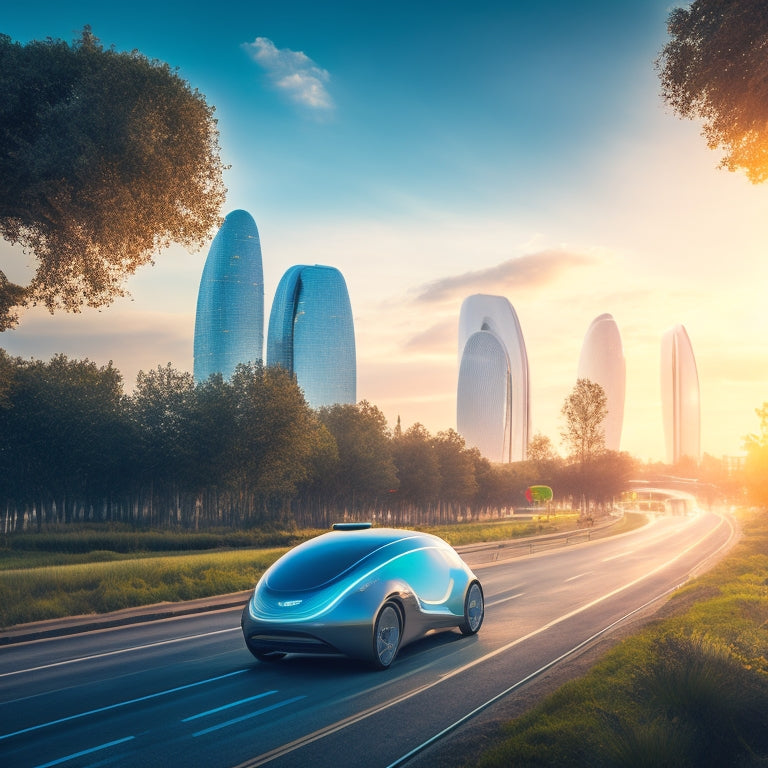
Electric Vehicles Revolutionizing Transportation and Environment
Share
Electric vehicles are transforming the transportation sector, offering a cleaner, more efficient, and increasingly cost-effective alternative to traditional fossil fuel-powered vehicles. With zero tailpipe emissions, they reduce greenhouse gas emissions, contribute to cleaner environments, and improve air quality. Advanced battery management systems and increased efficiency enable quicker acceleration and remarkable ranges. The rapid expansion of charging infrastructure alleviates range anxiety, making electric vehicle ownership more accessible. As the technology continues to evolve, the benefits of electric vehicles will only multiply, paving the way for a sustainable transportation revolution that prioritizes people and the planet. As the landscape continues to shift, the possibilities are endless.
Key Takeaways
• Electric vehicles produce zero tailpipe emissions, reducing greenhouse gas emissions and contributing to a cleaner environment.
• EVs offer a quieter, smoother ride and require lower maintenance costs, enhancing the driving experience.
• The rapid expansion of public and private charging infrastructure alleviates range anxiety, making long-distance travel more accessible.
• EVs boast increased efficiency, instant torque, and advanced battery management systems, providing remarkable ranges and performance.
• By transitioning to electric vehicles, we can combat climate change, achieve sustainability benefits, and create a healthier environment for future generations.
Benefiting People and the Planet
As the world shifts towards a more sustainable future, electric vehicles are emerging as a key solution, offering a plethora of benefits that not only enhance the driving experience but also contribute greatly to reducing humanity's ecological footprint.
The adoption of electric vehicles is vital for sustainable transportation, as they produce zero tailpipe emissions, reducing greenhouse gas emissions and air pollution. This, in turn, leads to a cleaner environment and improved public health.
Moreover, electric vehicles provide a quieter operation, instant torque, and lower maintenance costs, making them an attractive option for consumers.
As governments and companies invest in electric vehicle infrastructure, the shift to sustainable transportation is becoming increasingly accessible, paving the way for a cleaner, healthier, and more environmentally friendly future.
Electric Vehicle Capabilities
What capabilities do electric vehicles possess that make them an attractive alternative to traditional gasoline-powered vehicles?
Electric vehicles boast increased efficiency, leveraging technological advancements to minimize energy loss and maximize power output. This results in smoother acceleration, quieter operation, and improved overall performance.
In addition, electric vehicles offer instant torque, providing quicker acceleration and a more responsive driving experience.
Moreover, advanced battery management systems and optimized powertrains enable electric vehicles to achieve remarkable ranges, making them a viable option for daily commutes and extended road trips.
As electric vehicle technology continues to evolve, their capabilities are poised to expand, further solidifying their position as a compelling alternative to traditional vehicles.
Charging and Infrastructure
Electric vehicle owners can now charge their vehicles with greater convenience and flexibility, thanks to the rapid expansion of public and private charging infrastructure. The growth of charging networks has been instrumental in alleviating range anxiety, making long-distance travel more feasible.
Infrastructure expansion has also led to a significant increase in the number of public charging stations, providing drivers with more options for refueling on-the-go. As the charging network continues to expand, it is becoming increasingly convenient for drivers to own and operate electric vehicles.
With the infrastructure expansion showing no signs of slowing, the future of electric vehicle ownership looks brighter than ever.
Owning an Electric Vehicle
Beyond the convenience of charging infrastructure, owning an electric vehicle brings a unique set of benefits and considerations that can greatly enhance the overall driving experience. One of the most notable advantages is the cost savings. Electric vehicles require less maintenance compared to traditional vehicles, resulting in lower costs over the vehicle's lifespan.
Additionally, electric vehicles provide numerous benefits, including:
-
Lower operating costs: Electric vehicles are notably cheaper to run, with lower fuel costs and reduced maintenance requirements.
-
Increased safety: Electric vehicles have fewer moving parts, reducing the risk of mechanical failure and potential accidents.
-
Enhanced performance: Electric vehicles provide instant torque, resulting in smoother and quieter acceleration.
Environmental Advantages
As the world shifts towards a more sustainable future, the environmental advantages of electric vehicles have become increasingly important in the quest to mitigate climate change. One of the most significant benefits is the reduction in greenhouse gas emissions, contributing to a cleaner environment and improved air quality.
Electric vehicles produce zero tailpipe emissions, and when charged with renewable energy sources, their carbon footprint is further minimized. This emission reduction is essential in combating climate change, and the shift to electric vehicles plays a key role in achieving sustainability benefits.
Frequently Asked Questions
Can Electric Vehicles Be Charged Using Solar Power at Home?
Yes, electric vehicles can be charged using solar power at home through off-grid systems, enabling homeowners to harness renewable energy and reduce their carbon footprint, while ensuring a reliable and safe home charging experience.
Are Electric Vehicles More Prone to Accidents Due to Silent Operation?
"Silent sedans sparking safety concerns, electric vehicles' quiet operation raises risks for visually impaired pedestrians. However, pedestrian alerts and sound regulation measures mitigate these risks, ensuring a safer coexistence of EVs and vulnerable road users."
Do Electric Vehicles Have Limited Towing Capacities Compared to Gasoline Vehicles?
Electric vehicles generally have lower towing capacities compared to gasoline vehicles, mainly due to battery weight and powertrain limitations, although some models are designed for electric hauling, offering moderate towing capacities suitable for small to medium-sized trailers.
Can Electric Vehicles Be Used for Long Road Trips Without Range Anxiety?
A family of four set off on a 500-mile road trip in their electric vehicle, utilizing route planning tools to identify best charging stops along their route, alleviating range anxiety and ensuring a seamless long-distance travel experience.
Are Electric Vehicle Batteries Recyclable at the End of Their Life Cycle?
At the end of their life cycle, electric vehicle batteries can be recycled, enabling closed-loop production and minimizing waste, with companies developing responsible battery recycling practices to guarantee sustainable and environmentally responsible disposal.
Related Posts
-

7 Best Automated Sprinklers for Water-Wise Green Homes
You're likely among the 75% of U.S. homeowners who use in-ground sprinkler systems, and coincidentally, you're also c...
-

3 Earth-Loving Furniture Tips for Energy-Smart Homes
When furnishing your energy-smart home, you have the power to reduce your carbon footprint greatly by making consciou...
-

7 Top HEPA Filters for Green Building Projects
You need a reliable HEPA filter for your green building project that aligns with your sustainable goals and guarantee...


